News
Dairy alternatives to reach $35 billion
26 Aug 2016The dairy alternatives market is expected to reach $35.06 billion by 2024, according to a new report by Grand View Research, driven by rising consumer awareness of health issues and increasing cases of lactose intolerance.

The dairy alternatives market is expected to reach $35.06 billion by 2024, according to a new report by Grand View Research. It is expected to witness significant growth over the projected period owing to rising consumer awareness of health issues coupled with increasing number of lactose intolerance cases in various parts of the world. Increasing penetration of plant-based milk such as almond milk, soy milk and, coconut milk to replace cow milk is anticipated to propel demand.
Increasing consumer preference for lactose-free food products including cheese, desserts, and snacks are anticipated to drive demand, the research says, with rising consumer focus on the nutritional values offered by the product such as low calories and high proteins and vitamins likely to have a positive impact on the industry. Furthermore, Grand View believes that the shift of the consumer base towards a vegan diet, owing to factors including animal rights and environment protection, is anticipated to drive demand for dairy alternatives over the forecast period. However, it says, the high cost associated with these products as compared to dairy products is likely to hamper industry growth.The global dairy alternatives market has numerous players, Grand View notes, saying that it is dominated by a few including Danone, Vitasoy International, Sunopta, Earth’s Own Food, and Blue Diamond Growers. These companies, the researchers say, are engaged in developing and launching innovative and new products to consolidate their presence in the industry. However, growing consumer demand and rising consumer preference for high-quality products with low costs are anticipated to open new avenues for new players over the next eight years. The industry players are likely to establish and expand their business in the Asian Market in order to tap the increasing consumer demand associated with the changing lifestyle, growing population, rising disposable income and increasing number of lactose intolerance cases in countries such as China, Australia, New Zealand, India, Japan, and Korea.Related news
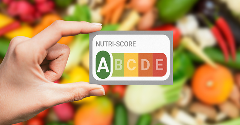
Danone removes NutriScore from products
20 Sep 2024
Following an algorithm update that gives some of its sweetened drinks a worse score, Danone has removed the front-of-pack label, NutriScore, from all of its products – putting profit before public health, say campaigners.
Read more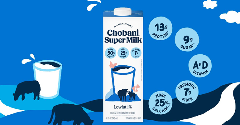
Chobani develops shelf-stable, prebiotic-enriched Super Milk
12 Sep 2024
Chobani has launched a prebiotic-enriched, shelf-stable, high-protein dairy milk to support people in disaster zones who need a nutritious drink that does not require refrigeration.
Read more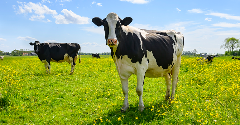
Tesco trials methane mitigation supplement for dairy cattle
5 Sep 2024
Tesco is trialing a methane-reducing feed supplement for one of its key UK dairy farms, sustainable UK milk producer Grosvenor Farms.
Read more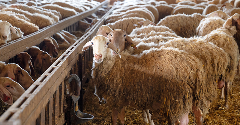
Sheep and goat plague: A new threat to Greece’s feta production
27 Aug 2024
A recent goat and sheep plague outbreak threatens feta production in Greece. The flagship product accounts for roughly 10% of the country’s food exports, but Greek authorities say there is no cause for concern.
Read more
Nestlé develops a new fat reduction method for dairy ingredients
26 Aug 2024
A Brazil-based Nestlé research and development team has developed a way to reduce the fat in milk powder by as much as 60%, without impacting the key characteristics that consumers enjoy.
Read more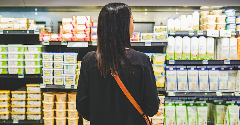
Dutch court rules against plant-based butter brand ‘Roombeter’: Only dairy products allowed to use the word ‘cream’
26 Jul 2024
A Dutch court has ruled against Upfield’s plant-based butter, Roombeter, stating that its use of the word ‘room’ (cream) in the product name violates European regulations that protect dairy-related terms allowed for dairy products only.
Read more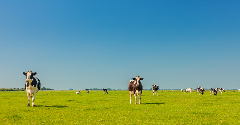
How will Denmark’s 2030 carbon tax impact farming?
12 Jul 2024
Denmark has announced plans to implement Europe’s first carbon tax on agriculture from 2030, targetting the farming sector’s CO2 emissions. How will it be implemented and how have farmers reacted?
Read more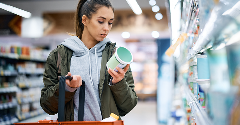
Sweden updates front-of-pack Keyhole labelling rules
11 Jul 2024
The Swedish Food Agency has announced updates to the voluntary Keyhole logo, used in four Nordic countries, following recommendations to improve nutrition labelling.
Read more
Consumers dislike faba beans’ sensory profile
3 Jun 2024
Consumers display low acceptance of faba beans, with sensory properties such as bitterness a core concern, a study suggests. However, for product varieties such as cocoa-free chocolate, this attribute could prove to be a benefit.
Read more
Food scientists uncover new way to preserve nutrient and flavour quality
29 May 2024
Researchers have developed a method that guarantees food safety for low-moisture products, such as dried milk, while maximising quality by retaining vitamins, minerals, and flavours, they say.
Read more